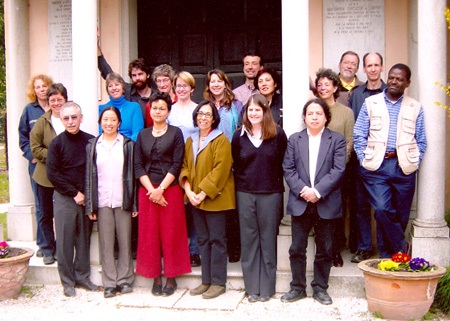Indigenous Experience Today
Date
Mar 18-25, 2005Organized by
Marisol de la Cadena and Orin Starn,Location
Hotel Villa Luppis, Pordenone, ItalyPublications
Indigenous Experience Today (Marisol de la Cadena and Orin Starn, Eds.), Berg, Oxford, 2007.Participants
- Amita Baviskar University of California-Berkeley, USA
- Michelle Bigenho Hampshire College, USA
- Claudia Briones University of Buenos Aires, Argentina
- Michael F. Brown Williams College, USA
- James Clifford University of California-Santa Cruz, USA
- Julie Cruikshank University of British Columbia, Canada
- Marisol de la Cadena University of California-Davis, USA
- Richard Fox Wenner-Gren Foundation, USA
- Kregg Hetherington University of California, Davis, USA
- Valerie Lambert University of North Carolina, USA
- Francesca Merlan Australian National University
- Francis Nyamnjoh CODESRIA, Senegal
- Mary Louise Pratt New York University, USA
- Louisa Schein Rutgers University, USA
- Paul Chaat Smith National Museum of the American Indian, USA
- Orin Starn Duke University, USA
- Anna Tsing University of California-Santa Cruz, USA
- Linda Tuhiwai Smith University of Auckland, New Zealand
- Emily Yeh University of Colorado, USA
ORGANIZER’S STATEMENT: This symposium focused on the theme of indigenous experience in the world today. Most observers, including anthropologists, believed that native peoples would vanish with modernity’s advance. Instead many tribal groups have survived into the 21st century, from Australian aborigines and New Zealand Maori to Native Americans in this country. Our symposium drew together a diverse group of scholars to examine the nature of indigenous culture and politics – and how they should be best understood – in various places worldwide. Together we were able to explore parallels and linked histories in the trajectory of modern native survival and resurgence. It was our consensus nonetheless that indigenous experience can only be understood through close attention to the strikingly varied histories, sensibilities, and configurations of power, culture, and economy of native groups in different parts of the world.
The conference brought together scholars interested in Africa, Asia, the Pacific Islands, and the Americas. Each presenter wrote a paper grounded in his or her own research as the basis for comparative conversation and the exploration of broader theoretical questions and problems. Why do some groups of people choose to identify as “Indian,” “native,” or “indigenous” and others not? How have indigenous peoples been affected by – and also shaped – the new dynamics of transnationalism and globalization? What has been the relation between indigenous politics and non-governmental organizations, national governments, and international multilateral groups? How have tourism and the hunger of Western tourists for an encounter with “authentic” tribal peoples figured into indigenous experience? How have native peoples organized to achieve social goals at a national and global level? These are some of the key questions that we probed during six days of intense, productive conversation.
We had breakout sessions in the last part of the symposium focused around four themes. One group explored the impact of colonialism and postcolonial government on indigenous peoples; a second took up the question of gender relations and their role in both native societies and popular perceptions of tribal groups; a third explored the uses by indigenous groups of technologies from writing to video and the Internet; and a fourth examined the problem of memory, violence, and suffering, and the place of concepts of guilt and obligation in popular perceptions of native peoples as well as their own self-understandings. During the final session, we turned to a one-by-one discussion of each specific paper, including concrete suggestions for revision for the conference volume. We expect to send the volume, with an introduction by the co-organizers, to press by the end of this year.
Wenner-Gren Symposium #135
